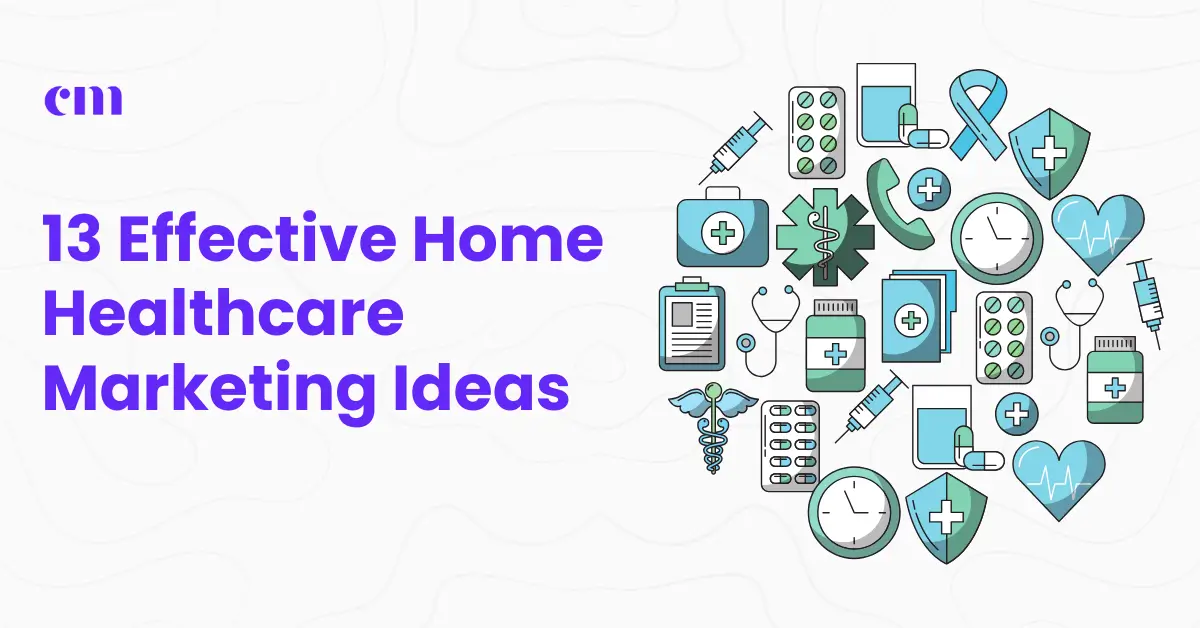Home health care marketing requires a targeted approach to reach potential clients and their families effectively.
Contents
ToggleAs the demand for home health services rises, competition among agencies intensifies.
To stand out, your marketing strategy must be innovative, personalized, and aligned with the needs of your target audience.
This guide presents home healthcare marketing ideas that will help your agency outrank competitors and attract new clients.
1. Know Your Target Audience
Your marketing plan should begin with a clear understanding of who you’re trying to reach.
In home health care, the primary decision-makers are often adult children of seniors, usually between 40-60 years old.
By understanding their needs—whether it’s long-term care, recovery assistance, or daily living support—you can tailor your messaging to resonate with them.
Key Demographics:
- Ages 65+: Direct consumers of care services.
- Ages 40-60: Decision-makers for senior care.
- Healthcare professionals: Potential referral sources.
2. Boost Local SEO for Better Visibility
Optimizing your website for local SEO is critical in the home health care sector.
Ensure your Google My Business profile is complete, accurate, and updated with essential information like contact details, services, and operating hours.
Including client testimonials, services, and relevant keywords (e.g., “home health care services near me”) on your website will improve your local search rankings and help potential clients find you faster.
Local SEO Checklist:
- Ensure NAP (Name, Address, Phone number) consistency across platforms.
- Optimize your website with local landing pages for each service area.
- Regularly update your Google My Business listing.
3. Leverage Social Media to Engage Families
With nearly 73% of adults aged 50-64 using Facebook, social media is a powerful tool for home health care agencies.
Posting valuable content like caregiving tips, client success stories, and testimonials can increase engagement.
You can also create paid ads targeting the demographic most likely to require home health services. Tools like HootSuite or Buffer can streamline social media management by allowing you to schedule posts across multiple platforms.
Social Media Tips:
- Share testimonials and success stories to build trust.
- Run health-related campaigns (e.g., “Fall Prevention Tips for Seniors”).
- Engage with followers through polls and Q&A sessions.
4. Run Referral Programs
Referrals remain one of the most reliable marketing tactics for home health care.
Encouraging satisfied clients to recommend your services to friends or family can lead to significant growth. Offering incentives like discounted services or gift cards can further motivate clients to participate.
Moreover, building a referral network with local healthcare professionals like doctors and pharmacists can drive even more client acquisition.
How to Set Up a Referral Program:
- Offer rewards for client referrals (e.g., discounts or gift cards).
- Build relationships with local healthcare providers for mutual referrals.
- Track referral sources to see which channels generate the most leads.
5. Build Partnerships in the Community
Strong relationships with community organizations and businesses can enhance your visibility and credibility.
Partner with senior centers, local pharmacies, or health fairs to build trust within the community.
Hosting educational workshops or support groups for caregivers not only helps the community but also positions your agency as a knowledgeable and compassionate resource.
Community Engagement Strategies:
- Sponsor or attend local events to increase visibility.
- Offer workshops on topics like senior safety or caregiving tips.
- Host support groups for caregivers.
6. Content Marketing and Blogging
Content marketing is a long-term home healthcare marketing strategy that builds trust and authority.
By regularly publishing informative blog posts on common topics like senior care, chronic disease management, and recovery tips, you can attract potential clients looking for answers.
Not only does this enhance your SEO, but it also positions your agency as an expert in the field.
Content Ideas:
- Write blogs addressing common client concerns (e.g., “How to Choose the Right Home Health Care Service”).
- Create guides on topics like managing chronic conditions or home safety.
- Use videos or infographics to simplify complex information.
You can also read: SEO Content Strategy with AI in 2025.
7. Paid Advertising CampaignsFseo
While organic methods like SEO and content marketing are valuable, paid advertising can provide immediate visibility.
Platforms such as Google Ads and Facebook Ads allow you to target specific demographics who are likely to require home care services.
These campaigns can help you reach the decision-makers quickly and effectively.
Key Strategies for Paid Ads:
- Google Pay-Per-Click (PPC) Ads: Target keywords like “senior home care” or “in-home nursing care,” ensuring you only pay when a potential client clicks on your ad.
- Facebook Ads: With over 77% of adults aged 50-64 using Facebook, it’s an excellent platform to run targeted ads based on location, age, and interests.
- Retargeting Ads: These ads show your content to people who have already visited your website or interacted with your social media, increasing the likelihood of conversion.
8. Video Marketing: Tell Your Story
Video content is one of the most engaging forms of home healthcare marketing, especially when showcasing personal, real-life stories.
Videos can highlight your agency’s services, showcase your caregivers’ expertise, or share testimonials from satisfied clients.
For home health care, behind-the-scenes videos, interviews with caregivers, and client success stories are powerful tools to build trust and credibility.
Effective Video Ideas:
- Create a virtual tour of a typical home care setup.
- Interview caregivers and clients to share personal stories.
- Offer educational videos on senior health and wellness.
9. Collect Reviews and Testimonials
Reviews and testimonials are key trust-building tools in any home health care marketing strategy.
Encouraging clients and their families to leave positive reviews on platforms like Google, Yelp, and industry-specific sites like Caring.com will help improve your online reputation.
According to research, a one-star increase on review platforms can boost a business’s revenue by up to 9%.
Tips for Collecting Reviews:
- Send automated emails asking for feedback after service.
- Respond to all reviews, positive or negative, showing that you care about client satisfaction.
- Feature the best reviews on your website and social media.
10. Email Marketing Campaigns
Email marketing is an essential, cost-effective tool to keep your agency top-of-mind.
By sending regular updates through email newsletters, you can stay connected with past clients, potential clients, and referral sources.
Emails can include health tips, updates about your services, and special promotions.
Email Marketing Best Practices:
- Segment your audience (e.g., families of current clients, potential clients, healthcare professionals) and tailor your content accordingly.
- Include valuable resources like caregiving tips or upcoming community events.
- Ensure your emails are mobile-friendly, as 46% of email opens happen on mobile devices.
11. Offline Marketing: Build Community Connections
While digital marketing for doctors is essential, offline marketing efforts still play a crucial role in building trust and credibility within your local community.
Participating in local health fairs, hosting workshops, and sponsoring community events can boost your visibility.
You can also distribute brochures and flyers to local pharmacies, doctor’s offices, and senior centers.
Ideas for Offline Marketing:
- Partner with local businesses to co-host health-related workshops.
- Sponsor or set up booths at local health fairs and expos.
- Provide free informational sessions on caregiving or senior health.
12. Optimize Your Website for Conversions
Your website should not only attract visitors but also convert them into clients. Ensure that it’s mobile-friendly, easy to navigate, and optimized for conversions.
Adding clear calls-to-action (CTAs), such as “Schedule a Free Consultation” or “Contact Us Today,” helps guide potential clients to take the next step.
Website Optimization Tips:
- Make it easy for visitors to find key information, such as contact details and services offered.
- Include live chat options to provide instant assistance to visitors.
- Use client testimonials, reviews, and before-and-after stories to build trust.
13. Utilize Analytics and Data
To ensure your home healthcare marketing strategies are working, implement analytics tools to track and measure performance.
Tools like Google Analytics can help you monitor website traffic, while social media insights provide data on engagement.
Analyzing this data will allow you to refine your strategies and focus on what brings the best results.
Key Metrics to Monitor:
- Website traffic: Where is your traffic coming from?
- Conversion rate: How many visitors are becoming clients?
- Engagement rate: How are people interacting with your content on social media?
- ROI: Measure the return on investment for paid campaigns.
Conclusion
A successful home healthcare marketing strategy combines a mix of digital and offline tactics tailored to your target audience’s needs.
By utilizing local SEO, content marketing, paid ads, and building strong community connections, your agency can increase its visibility and convert potential clients into long-term customers.
Monitoring the performance of these strategies with analytics tools will ensure continual improvement and growth in the competitive home health care market.
If you’re looking to implement cutting-edge marketing strategies for your home health care business, Crawl Math is here to help. Specializing in healthcare marketing, Crawl Math can enhance your online visibility, streamline your SEO efforts, and drive client acquisition through targeted campaigns.
Don’t let your marketing fall behind. Contact us today and let our expert team craft a personalized marketing plan that will drive growth and set you apart from the competition.


